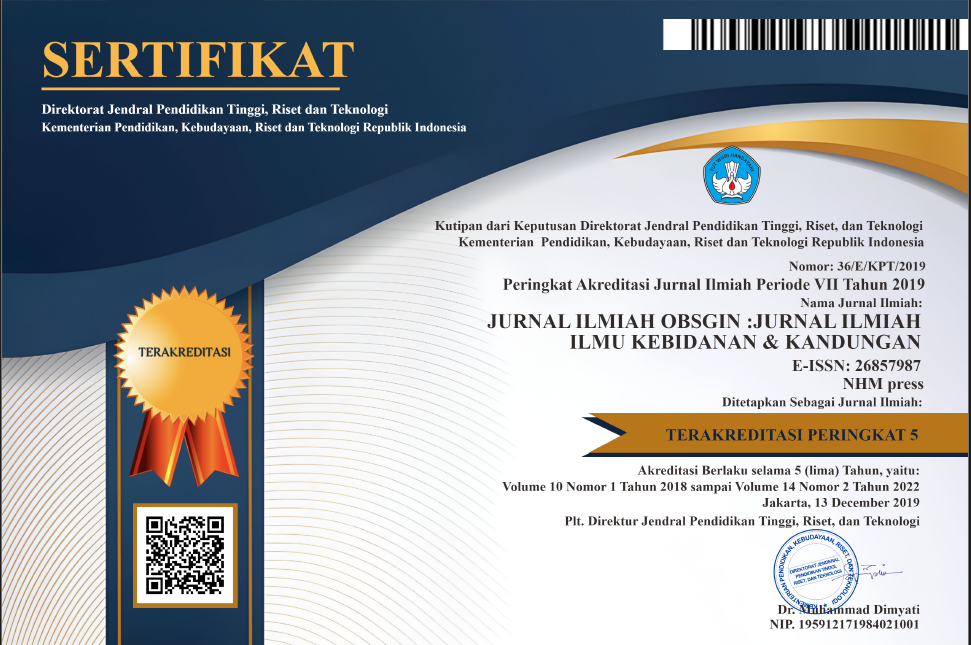Hubungan Dukungan Keluarga Pada Ibu Hamil Trimester III Dalam Persiapan Persalinan Aman di Ponkesdes Sumberpetung Ranuyoso Kabupaten Lumajang
Abstract
Childbirth is one of the most special and important experiences in a woman's life. This involves major challenges during the labor preparation process, including physical changes, psychological stress, role transformation, and changes in family structure. Maternity readiness is a condition in which every pregnant woman and her family make prior decisions about the place of birth, service providers, and health facilities, and have selected the main items before giving birth. This study aims to determine the relationship of family support to third trimester pregnant women in preparation for safe delivery at Ponkesdes Sumberpetung Ranuyoso, Lumajang Regency.This study was a correlational design with a cross-sectional approach. The population in this study were all third trimester pregnant women in preparation for safe delivery at Ponkesdes Sumberpetung Ranuyoso, Lumajang Regency, involving 36 participants. The sampling technique used is total sampling. Data was collected using a data collection sheet. Data were analyzed using Predictive Analytics SoftWare Version 18 with the spearman rho test at a significance level of <0.05. The results showed that the third trimester pregnant women at Ponkesdes Sumberpetung Ranuyoso, Lumajang Regency, mostly had family support at a moderate level (63.9%) and more than half had Childbirth Readiness at a fairly optimal level (55.6%). The results of the analysis show that there is a relationship between family support for third trimester pregnant women in preparation for safe delivery with a positive correlation level (p-value = 0.000; r = 0.838). Family support forms adaptive coping for pregnant women because through support by the family it is able to increase self-motivation among mothers so that they are able to take a stand and be able to prepare for childbirth safely.
References
Andarge. (2021). Factors associated with birth preparedness and complication readiness in Southern Ethiopia: a community based cross sectional study. BMC Pregnancy and Childbirth, 17(412).
Chen, Wu, & Ji. (2020). The effects of family, society and national policy support on treatment adherence among newly diagnosed tuberculosis patients: a cross-sectional study. BMC Infectious Disease, 20(623).
Dennis. (2018). Peer support within a health care context: a concept analysis. International Journal Nursing Study, 40(3).
Doseey, Keegan, & Barrere. (2016). Holistic Nursing a Handbook for Practice. Jones Bartlett Learning.
Dwijayanti. (2013). Analisis Implementasi Program Perencanaan Persalinan Dan Pencegahan Komplikasi (P4K) Oleh Bidan Desa Di Kabupaten Demak. Jurnal Kesehatan Masyarakat, 2(1).
Friedman, & Marilyn. (2013). Buku Ajar Keperawatan Keluarga Riset, Teori dan Praktik. Penerbit Buku Kedokteran EGC.
Gao, & Ma. (2020). Maternal health behaviors during pregnancy in rural Northwestern China. BMC Pregnancy and Childbirth, 20(745).
Greifenender, & Bless. (2018). Social Cognition How Individuals Construct Social 2nd Edition. Routledge.
Kaakinen, J., Coehlo, D., Steele, Re., Tabacco, A., & Hanson, S. (2015). Family Health Care Nursing. F.A Davis Company. http://www.sbmu.ac.ir/uploads/FamilyHealthCare2010,Book.pdf
Kamineni, & Murki. (2017). Birth preparedness and complication readiness in pregnant women attending urban tertiary care hospital. Journal of Family Medicine and Primary Care, 6(2).
Khaled. (2020). Prenatal relationship conflict behavior predicts childbirth experiences and birth outcomes. Journal Family and Psychology, 34(6).
Kim, & Bae. (2018). Socioeconomic status can affect pregnancy outcomes and complications, even with a universal healthcare system. International Journal for Equity in Health, 17(2).
Kim, Taylor, & Gutter. (2016). Extended Families: Support, Socialization, and Stress. Family and Consumers Science Journal, 1(1).
Lee. (2016). Differences in pregnancy outcomes, prenatal care utilization, and maternal complications between teenagers and adult women in Korea: a nationwide epidemiological study. Medicine, 95(4630).
Limenih. (2019a). Birth preparedness, readiness planning and associated factors among mothers in Farta district, Ethiopia: a cross-sectional study. BMC Pregnancy and Childbirth, 19(17).
Limenih. (2019b). Birth preparedness, readiness planning and associated factors among mothers in Farta district, Ethiopia: a cross-sectional study. BMC Pregnancy and Childbirth, 19(171).
Marrore. (2019). Strategies for helping families prepare for birth:experiences from eastern central Uganda. Global Health Action, 8(23).
Mengmei. (2022). Childbirth Readiness Scale (CRS): instrument development and psychometric properties. BMC Pregnancy and Childbirth, 22(257).
Orwa. (2020). Birth preparedness and complication readiness among women of reproductive age in Kenya and Tanzania: a community based cross-sectional survey. BMC Pregnancy and Childbirth, 20(636).
Renbarger. (2021). The Influence of Four Constructs of Social Support on Pregnancy Experiences in Group Prenatal Care. Women Health Reproduction Journal, 2(1).
Ruth. (2018). Family Support, Family Income, and Happiness: A 10-Year Perspective. Journal of Family Psychology, 22(3).
Siakwa. (2016). Family and community support systems for expectant mothers on birth preparedness in Northern Ghana. International Journal of Reproduction, Contraception, Obstetrics and Gynecology, 5(11).
Silwal. (2020). Factors Influencing Birth Preparedness in Rapti Municipality of Chitwan, Nepal. International Journal of Pediatric, 7402163.
Skurzak. (2015). Social support for pregnant women. Public Health Perspective Journal, 10(1515).
Yang, Kumar, & Cao. (2020). Social support and clinical improvement in COVID-19 positive patients in China. US National Library of Medicine National Institutes of Health, 68(6).
Yasouka, & Nanishi. (2018). Barriers for pregnant women living in rural, agricultural villages to accessing antenatal care in Cambodia: A community-based cross-sectional study combined with a geographic information system. Plos One Journal, 13(3).
Yin, Wang, & Wei. (2018). The relationship between social support, treatment interruption and treatment outcome in patients with multidrug-resistant tuberculosis in China: a mixed-methods study. Tropical Medicine & International Health, 23(6), 668.
Zepre. (2017). Birth preparedness and complication readiness among rural women of reproductive age in Abeshige, district, Guraghe zone, SNNPR, Ethiopia. International Journal Womans Health, 9(11).
Zhang. (2018). Socioeconomic inequalities and determinants of maternal health services in Shaanxi Province, Western China. Plos One Journal, 5(9).












